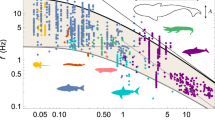Abstract
Bainbridge1 and Nursall2 have questioned the validity of certain fish swimming speed estimates because these require that either completely laminar flow or very high power factors must be postulated in order to explain the animals' performance. Speeds in excess of 45 km/h are included in this suspect category. Walters3 showed that certain morphological features indicate that scombroid fishes may attain velocities of 10 body-lengths/sec, and the large species should be able to attain maximum speeds considerably in excess of 45 km/h.
This is a preview of subscription content, access via your institution
Access options
Subscribe to this journal
Receive 51 print issues and online access
$199.00 per year
only $3.90 per issue
Buy this article
- Purchase on Springer Link
- Instant access to full article PDF
Prices may be subject to local taxes which are calculated during checkout
Similar content being viewed by others
References
Bainbridge, R., Problems of Fish Locomotion, Zool. Soc. London, Symp., 5, 13 (1961).
Nursall, J. R., Amer. Zool., 2, 127 (1962).
Walters, V., Amer. Zool., 2, 143 (1962).
Author information
Authors and Affiliations
Rights and permissions
About this article
Cite this article
WALTERS, V., FIERSTINE, H. Measurements of Swimming Speeds of Yellowfin Tuna and Wahoo. Nature 202, 208–209 (1964). https://doi.org/10.1038/202208b0
Issue Date:
DOI: https://doi.org/10.1038/202208b0
This article is cited by
-
Scaling the tail beat frequency and swimming speed in underwater undulatory swimming
Nature Communications (2023)
-
Catch and bycatch captured by tropical tuna purse-seine fishery in whale and whale shark associated sets: comparison with free school and FAD sets
Biodiversity and Conservation (2019)
-
Depth distribution and temperature preferences of wahoo (Acanthocybium solandri) off Baja California Sur, Mexico
Marine Biology (2011)
-
Cardiovascular and respiratory physiology of tuna: adaptations for support of exceptionally high metabolic rates
Environmental Biology of Fishes (1994)
-
Thermal dependence of contractile properties of single skinned muscle fibres from Antarctic and various warm water marine fishes including Skipjack Tuna (Katsuwonus pelamis) and Kawakawa (Euthynnus affinis)
Journal of Comparative Physiology B (1984)
Comments
By submitting a comment you agree to abide by our Terms and Community Guidelines. If you find something abusive or that does not comply with our terms or guidelines please flag it as inappropriate.



